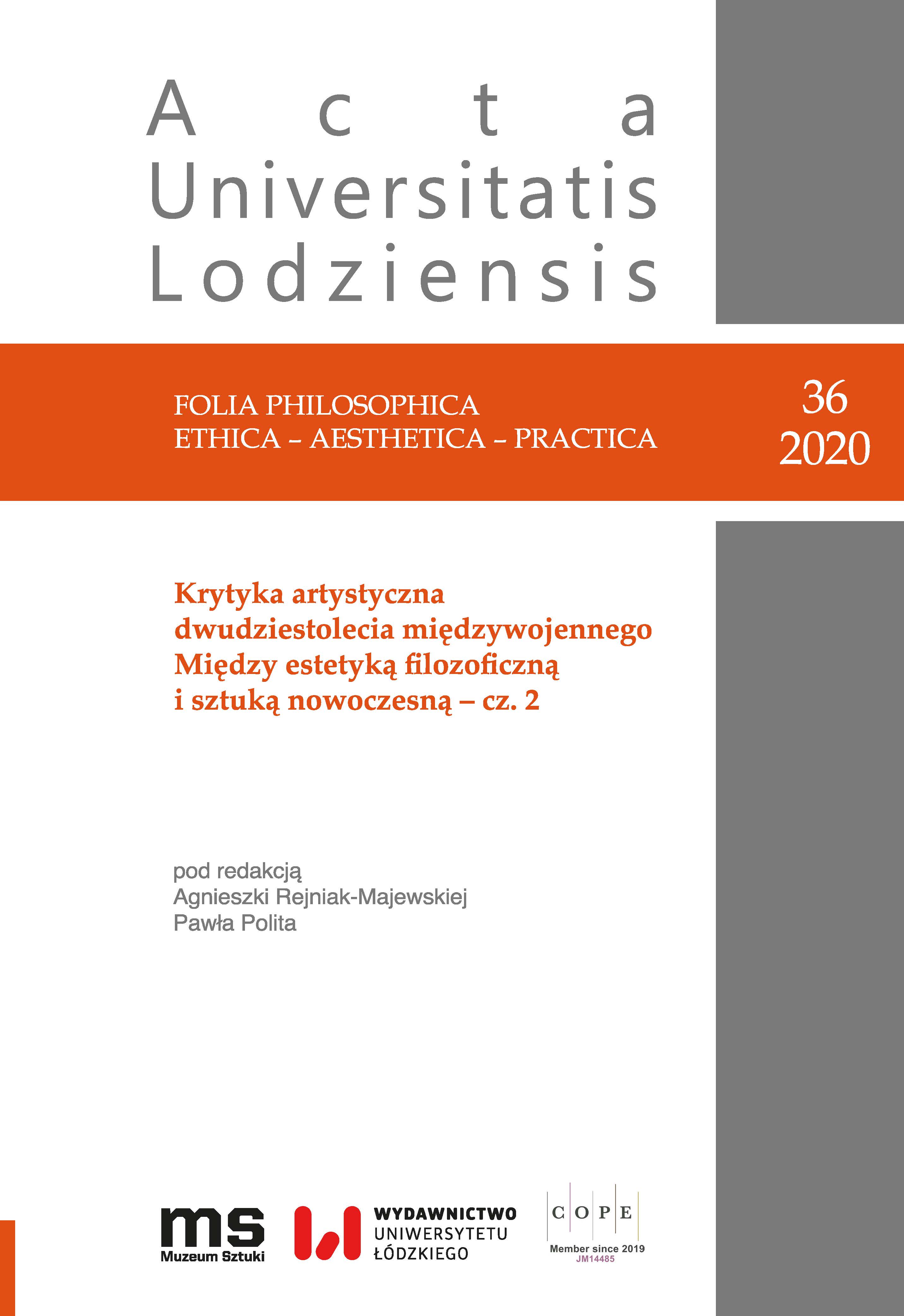Docieranie do rdzenia rzeczy. Współzależność form życia i sztuki w esejach Debory Vogel
DOI:
https://doi.org/10.18778/0208-6107.36.02Schlagworte:
Debora Vogel, Lu Märten, Jakob von Uexküll, sztuka nowoczesna, abstrakcja a rzeczowość, banalność, sztuka i życieAbstract
Artykuł przedstawia Deborę Vogel (1900–1942) jako jedną z najważniejszych krytyczek i teoretyczek sztuki lat trzydziestych XX wieku. Po polsku oraz w jidysz stworzyła ona system, w którym sztuka jawi się jako poetycko-programowa reakcja na rzeczywistość. Jest ona elitarna, ale też ściśle związana z codziennością. Jest niezbędna dla życia, ale też jest „samym życiem”, w sensie banalnej i wiecznej ballady. Za tą konstrukcją myślową kryje się malarstwo Marca Chagalla. To na przykładzie jego obrazów Vogel dowodzi głównej tezy awangardy o jedności formy i treści. Na tożsamość życia i sztuki Vogel spogląda przez pryzmat aktualności rozumianej nie jako manifestowanie poglądów politycznych, lecz jako konstruowanie rzeczywistości w dziele sztuki. Punktem wyjścia jest dla lwowskiej intelektualistki estetyka Hegla, od której stopniowo przesuwa się ku dialektyce materialistycznej, rozwijając m. in. tezy Lu Märten, pionierki estetyki marksistowskiej. Poetyka życia oraz koncepcje sztuki były u Vogel szeroko zakorzenione w filozofii, m.in. w teorii subiektywnego postrzegania Jakoba von Uexkülla. W artykule omówiona zostaje jego koncepcja koła funkcjonalnego, jak i mająca duży wpływ na artystów awangardowych teza, iż rzeczywistość stanowi dla indywiduum wyłącznie konstrukcję własnych doznań zmysłowych. Na koniec stawiane są pytania dotyczące znaczenia myśli Bergsona i Simmla dla rozumienia sztuki w ujęciu proponowanym przez Deborę Vogel.
Literaturhinweise
Behne Adolf, Biologie und Kubismus, „Der Sturm” 1915, nr 11/12, s. 68–71.
Google Scholar
Behne Adolf, Neues Bauen Neues Wohnen, Hesse & Becker Verlag, Leipzig 1930.
Google Scholar
Behne Adolf, Schriften zur Kunst, red. Cornelia Briel, Gebr. Mann Verlag, Berlin 1998.
Google Scholar
Behne Adolf, Zur neuen Kunst, Verlag Der Sturm, Berlin 1915.
Google Scholar
Bergson Henri, Schopferische Entwicklung, Eugen Dietrichs, Jena 1912.
Google Scholar
Croce Benedetto, Lebendiges und Totes in Hegels Philosophie, C. Winter, Heidelberg 1909.
Google Scholar
Degler Janusz, Debora Vogel i Witkacy, „Ogród” 1994, nr 1 (17), s. 208–212.
Google Scholar
Elias Norbert, Gesammelte Schriften I: Frühschriften, red. Reinhard Blomert i in., Suhrkamp, Frankfurt a.M. 2002.
Google Scholar
Endell August, Vom Sehen. Texte 1896–1925 über Architektur, Formkunst und „Die Schönheit der großen Stadt”, red. Helge David, Birkhäuser, Basel–Berlin–Boston 1995.
Google Scholar
Europa Almanach. Malerei, Literatur, Musik, Architektur, Plastik, Bühne, Film, Mode, red. Carl Einstein, Paul Westheim, Gustav Kiepenheuer Verlag, Potsdam 1925.
Google Scholar
Jakob von Uexküll: A paradigm for biology and semiotics, red. Kalevi Kull, wydanie specjalne pisma „Semiotica” 2001, nr 134.
Google Scholar
DOI: https://doi.org/10.1515/semi.2001.013
Kapuściński Grzegorz, O metaforze przestrzennej w komunikowaniu. Między kulturą a naturą, „Miscellanea Anthropologica et Sociologica” 2014, nr 15 (1), s. 71–83.
Google Scholar
DOI: https://doi.org/10.5604/20842937.1122743
Köhnen Ralph, „Wahrnehmung wahrnehmen“. Die Poetik der „Neuen Gedichte“ zwischen Biologie und Phänomenologie: von Uexküll, Husserl und Rilke, w: Rilkes Paris 1920–1925. Neue Gedichte, red. Erich Unglaub, Jörg Paulus, Wallstein Verlag, Göttingen 2010, s. 196–211.
Google Scholar
Märten Lu, Wesen und Veränderung der Formen/Künste. Resultate historisch materialistischer Untersuchungen. Der Taifun-Verlag, Frankfurt a.M. 1924.
Google Scholar
Mildenberger Florian, Umwelt als Vision. Leben und Werk Jakob von Uexkülls, Franz Steiner Verlag, Stuttgart 2007.
Google Scholar
Montaże. Debora Vogel i nowa legenda miasta, red. Andrij Bojarov, Paweł Polit, Karolina Szymaniak, wyd. Muzeum Sztuki w Łodzi, Łódź 2017.
Google Scholar
Rem Michał, O „nowej rzeczowości” w Polsce, „Europa” 1929, nr 2, s. 85–86.
Google Scholar
Roh Franz, Nach–Expressionismus. Magischer Realismus. Probleme der neuesten europäischen Malerei, Klinkhardt & Bierman, Leipzig 1925.
Google Scholar
Schulz Bruno, Księga listów, red. Jerzy Ficowski, Słowo/Obraz Terytoria, Gdańsk 2008.
Google Scholar
Simmel Georg, Lebensanschauung. Vier metaphysische Kapitel, Druckner & Humblot, München–Leipzig 1918.
Google Scholar
Surreale Sachlichkeit. Werke der 1920er und 1930er–Jahre aus der Nationalgalerie, red. Kyllikki Zacharias, Nationalgalerei, Staatliche Museen zu Berlin, Berlin 2016.
Google Scholar
Szymaniak Karolina, Być agantem wiecznej idei. Przemiany poglądów estetycznych Debory Vogel. Kraków 2006.
Google Scholar
Uexküll von Jakob, Die Lebenslehre, Müller & Kiepenheuer, Potsdam–Zürich 1930.
Google Scholar
Uexküll von Jakob, Theoretische Biologie, Paetel, Berlin 1920.
Google Scholar
Uexküll von Jakob, Umwelt und Innenwelt der Tiere, Springer, Berlin 1909.
Google Scholar
Vogel Debora, Akacje kwitną. Montaże, posł. Karolina Szymaniak, Austeria, Kraków 2006.
Google Scholar
Vogel Debora, Der mut cu zajn ajnzam, „Der Morgen” 1930, nr 1223, s. 7–8.
Google Scholar
Vogel Debora, Die Geometrie des Verzichts. Gedichte, Montagen, Essays, Briefe, tłum. oraz red. Anna M. Misiak, Arco Verlag, Wuppertal 2016.
Google Scholar
Vogel Debora, Forma i tematyka w sztuce Chagala, w: Almanach i Leksykon Żydostwa Polskiego, Herman Dicker, Lwów 1938, t. 2 Temat i forma w sztuce Chagalla. Próba krytyki estetycznej. Także w: „Ogród” 2003, nr 1–2 (21–22), s. 238–251.
Google Scholar
Vogel Debora, Kilka uwag o współczesnej inteligencji, „Przegląd Społeczny” 1936, nr 6, s. 114–121.
Google Scholar
Vogel Debora, Legenda współczesności w literaturze dziecięcej, „Przegląd Społeczny” 1934, nr 3, s. 41–46.
Google Scholar
Vogel Debora, Lektura w okresie dojrzewania, „Przegląd Społeczny” 1928, nr 6, s. 26–28.
Google Scholar
Vogel Debora, Marc Chagall (Z okazji 50–lecia urodzin), „Jednodniówka. Żydowski Uniwersytet Ludowy we Lwowie” 1937, s. 19–20.
Google Scholar
Vogel Debora, Mieszkanie w swej funkcji psychicznej i społecznej, „Przegląd Społeczny” 1932, nr 8–9, s. 208–217.
Google Scholar
Vogel Debora, Motyw codzienności w literaturze dziecięcej, „Przegląd Społeczny” 1933, nr 11, s. 235–240.
Google Scholar
Vogel Debora, O kształtowaniu nastawienia życiowego, „Przegląd Społeczny” 1928, nr 3, s. 12–15.
Google Scholar
Vogel Debora, Z wystaw Związku zawodowego Artystów Plastyków we Lwowie, „Sygnały” 1939, nr 61, s. 8.
Google Scholar
Vogel Debora, Zagadnienie indywidualności i możliwości indywidualizacji w okresie dojrzewania, „Przegląd Społeczny” 1928, nr 7, s. 9–20.
Google Scholar
Downloads
Veröffentlicht
Zitationsvorschlag
Ausgabe
Rubrik
Lizenz

Dieses Werk steht unter der Lizenz Creative Commons Namensnennung - Nicht-kommerziell - Keine Bearbeitungen 4.0 International.












